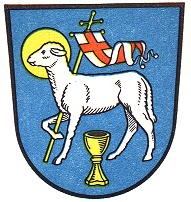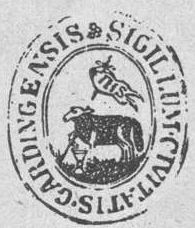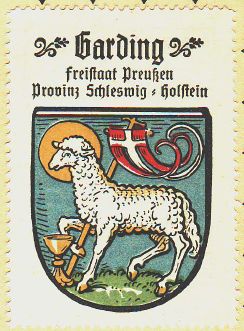Garding: Difference between revisions
Knorrepoes (talk | contribs) m (Text replacement - ". ===Origin/meaning===" to ". |- |'''English''' | {{blazon wanted}} |} ===Origin/meaning=== ") |
Knorrepoes (talk | contribs) m (Text replacement - "===Origin/meaning=== The" to "===Origin/meaning=== The") |
||
| Line 21: | Line 21: | ||
===Origin/meaning=== | ===Origin/meaning=== | ||
The arms were granted on December 30, 1963. | The arms were granted on December 30, 1963. | ||
Revision as of 08:19, 18 July 2022
This page is part of the German heraldry portal Deutsche Wappensammlung |
Heraldry of the World |
|
German heraldry:
|
Selected collector's items from Germany:
|
GARDING
State : Schleswig-Holstein
District (Kreis) : Nordfriesland (until 1970 Eiderstedt)
Amt : Amt Eiderstedt (since 2006)
| German |
In Blau, unten begleitet von einem goldenen Abendmahlskelch, das golden nimbierte silberne Gotteslamm, mit dem rechten Vorderfuß die geschulterte Siegesfahne haltend: an goldener, oben in ein Kreuz auslaufender Stange ein silbernes, in zwei Zipfel endendes Banner mit rotem, durchgehendem Kreuz. |
| English | No blazon/translation known. Please click here to send your (heraldic !) blazon or translation |
Origin/meaning
The arms were granted on December 30, 1963.
Garding received city rights in 1590 by Duke Johann Adolf von Gottorp of Holstein. The first seal, which dates from the same time, already shows the Agnus Dei. On the banner the letters S.O.G. (Sigillum Oppidi Gardingensis) were placed, not the cross as in the present arms. The origin of the lamb is not known, the patron saints of Garding are St. Bartholomew and St. Christian (who can be seen on the seal of the Gardingerharde, the area around the city). Until 1963 the city used the lamb without a shield as its symbol.
| The municipal stamp shown in 1892 |
The arms by Hupp in the Kaffee Hag albums +/- 1925 |
Contact and Support
Partners:
Your logo here ?
Contact us
© since 1995, Heraldry of the World, Ralf Hartemink 
Index of the site
Literature : Stadler, 1964-1971, 8 volumes; Kaffee Hag albums, 1920s; Reissmann, 1997.














